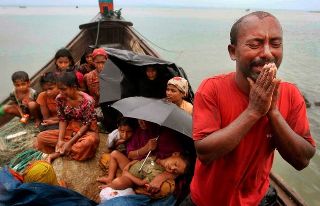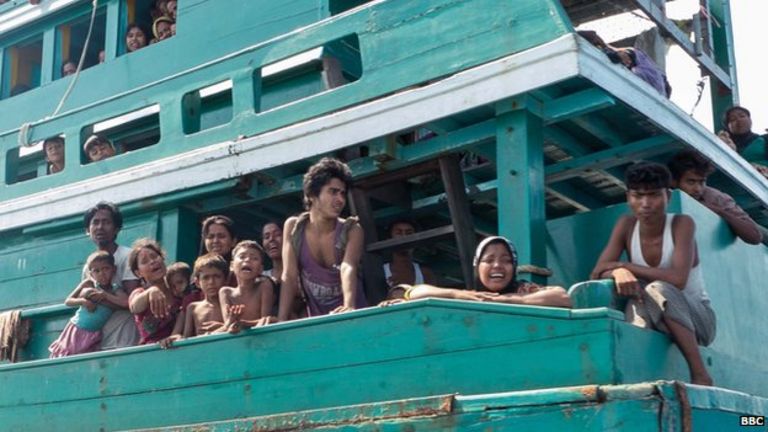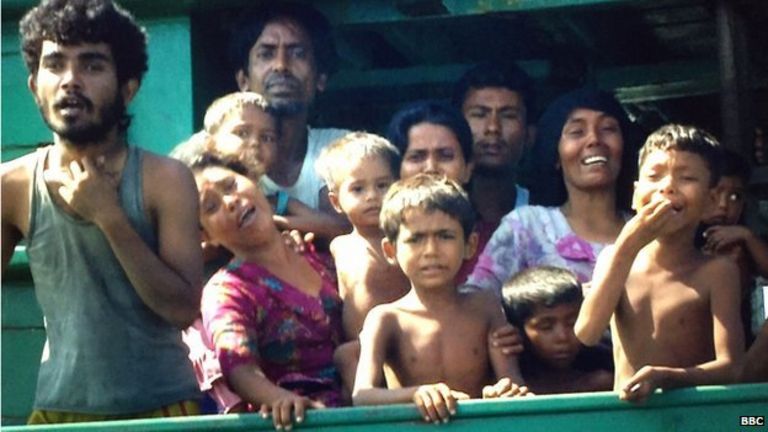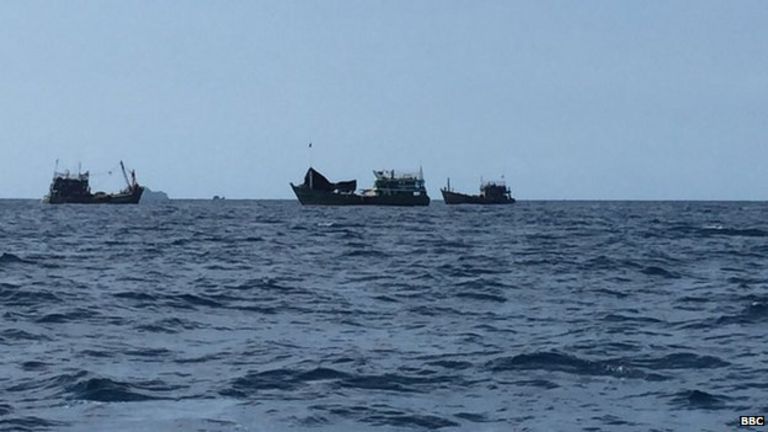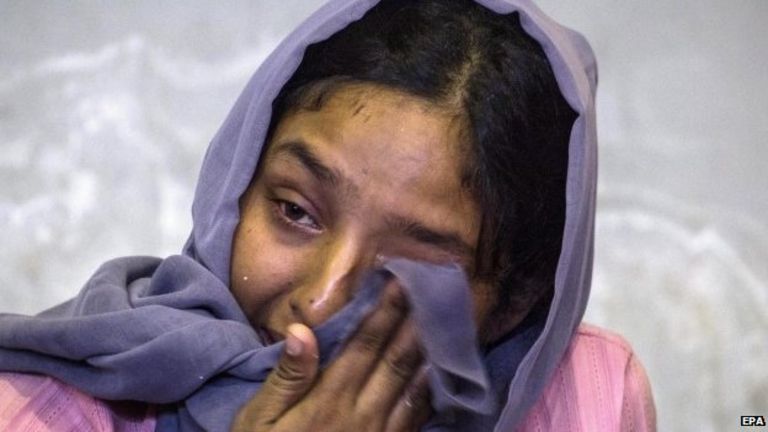Amine Tuna Ertürk
Interview with Dr Maung Zarni
Grave atrocities Rohingya people are facing in Myanmar, also known as Burma, is alarming. The Rohingya people numbering 1,3 million is a Muslim minority living in the Arakan state in western Myanmar. Although they are living in the country for generations they are denied citizenship and basic necessities including basic healthcare, work and schooling. They are primary targets of hate crimes and discrimination amounting to genocide fueled by extremist nationalist Buddhist monks and Thein Sein government. Yet there are notable figures within the country who embrace Rohingya struggle and dares to speak about the condition of Rohingya. Buddhist scholar Dr Maung Zarni, member of the Permanent People's Tribunal on Sri Lanka and a co-author of The Slow Burning Genocide of Myanmar's Rohingya (2014) is an outspoken critic of racist nationalism and violence in his native country. As a prominent dissident of semi-military regime of Thein Sein, he has fled from Myanmar due to safety concerns and resides in London. We conducted an interview via email with Dr Zarni offering invaluable insights into the complex sociopolitical situation in Myanmar today.
Some Rakhine Buddhists argue that they are falsely accused and they are real victims who are under constant threat in their own land. Do you think this is true? Do you think that both Muslims and Buddhists have equal share in escalating violence?
Both Rohingyas and Rakhines are victims of Burmese oppression. The Rohingyas fare worst as they suffer from double-oppression: the legalized persecution by the Burmese central government since early 1978, and direct and state-organized terror campaigns to drive them out of Burma -on grounds that they pose a "threat to national security" because of their historical and anthropological link with former East Bengal (East Pakistan until 1973 and Bangladesh since Bangladesh's independence in 1973)- and the racist and majority Buddhist Rakhine who treat them like dirt.
The Rakhines are a colonized people by the Buddhist Burmese since 1785 when their kingdom was decimated by the invading Burmese. The Rakhines outnumber Rohingya by 3/1. Rakhines man local administrative and authority structure, in addition. So, when Rakhines say they are threatened by the Rohingyas, it is really a case of Rakhines scapegoating the Rohingyas for the real oppression, colonial control and economic exploitation by the Burmese and the Burmese military. Because the Burmese military is way too powerful for the Rakhines to rise up against the Rakhine take their rage and grievances out on the most vulnerable but widely disliked Rohingyas in their midst.
The Rohingya population was denied to self identify in the 2014 nationwide census. What consequences do you foresee?
Not only are they denied the right to self-identity -which is international legal/human rights norm- they are being forced to assume an identity as "Bengali" by their oppressor: both the Burmese regime and the Rakhine and other Buddhists, especially the majority Burmese. The consequences are of genocidal proportions: destruction of the entire ethnic community, both starting and ending with the identity erase.
Myanmar is to hold general elections in 2015. Do you think elections' result will reduce the role of military in politics? Is there a possibility of emerging of a new political cadre which will address the Rohingya issue?
Regardless of what happened in the elections, whoever wins, there is generally speaking no political class or circle among the pro-democracy, pro-human rights opposition movement or the ruling military regime. They all share common genocidal strain of racism against the Rohingya. Aung San Suu Kyi is no better in this regard, except she is likely to respond more positively to the international pressure than the regime has been.
The military will find ways to control politics and economy -in spite of the elections- as long as the Constitution is not changed significantly, especially the 3 clauses: 1) which legalizes any future coup by the commander in chief; 2) bars any type of judicial persecution against the military oppressors and 3) guarantee 25% of the parliamentary seats.
The leader of the 969 Movement, Monk Ashin Wirathu stated several times that the movement is unfairly blamed for rising Islamophobia in the country. And President Thein Sein defended Wirathu saying his order was just striving peace and prosperity. How do you see these remarks?
Wirathu was on the record (tape-recorded and it is now on line) that he wanted to launch and lead a campaign to purge Burma of all Muslims -"starve them to death, make them homeless"- in a style of a CIA operation -all in his own words. His intention was made public to a gathering of hundreds of monks at a well-known Buddhist pavilion in Mandalay as early as 2004 before he was sentenced to jail and jailed, for his involvement in burning alive an entire Muslim family -a well-to-do grocer and a Haj returnee- in his birthplace called Kyauk Hse (about 45 minutes drive from Mandalay).
Burmese intelligence and the entire government of Thein Sein (and before him the now aging despot General Than Shwe) knew all this. But the problem is the military regime agrees with Wirathu's ideas. Myanmar generals have systematically "cleansed" the armed forces in Burma of all Muslim officers over the past 53 years -as a matter of unstated anti-Muslim policies. In fact, only Buddhists are promoted. Now the military has stopped recruiting any Muslims for any rank, however low in the armed forces. In addition,Reuters news agency documented that the highest level of military leadership has authorized and commissioned the Ministry of Religious Affairs to publish anti-Muslim writings over the past 27 years -starting with Than Shwe's boss named Senior General Saw Maung. So, when Thein Sein as President was defending Wirathu he is lying with a straight face. Nothing less.
Do you think the Arakan conflict is for the advantage of Burmese government since Arakanese Muslims are often treated as a scapegoat?
Yes, so far the horizontal aspect of the conflict in Rakhine between Rohingyas and the Rakhine has enabled the regime in central Burma to divert attention of the domestic constituency -mainly Buddhist monks and Burmese public- away from the real issue of continued control of economy and power in the country. But mind you the conflict has been exploited, expanded and blown out of proportions by the Burmese military -which is the original sponsor of a state-directed, legalized and policy-induced mass persecution- in a word, genocide -of the Rohingyas.
Aung San Suu Kyi is a prominent opposition figure having massive popularity inside the country and abroad. Yet she kept quiet on the rights of minorities in the country especially Rohingya. What are the reasons behind it? Do you think it may change in the near future if she prevails in the political struggle with Thein Sein and military?
She is a racist herself -who has justified Islamophobia of the Buddhists on Britain's Radio Four, in the fall of 2013- to a famous TV and radio interviewer Mishal Hussein. There is no factual basis or prospect that she will be less racist in the least likely event that the military will ever let her assume presidency.
Myanmar is an ethnically diverse county and Rohingya is not the only Muslim minority in the country. How is the relationship of Rohingya with other minorities? Are all minorities subject same kind of aggressive minority policies of the government?
No, only Rohingyas are the victims of sustained genocidal persecution for nearly 40 years. Other minorities, Buddhists and Christians (including Karens and Kachins and Chins, etc.) as well as even non-Rohingya Muslims are racist towards the Rohingyas -as the direct result of nearly 40 years of the media and the education system demonization and illegalization of the Rohingyas.
How did British colonial administration treat the Muslim community in the country? What are the legacies of British colonial administration regarding the Arakan issue?
British colonialism was not simply about economic exploitation and political control. It was a huge edifice of multiple-racisms. British colonial rulers were racist and genocidaires themselves. It is well-documented that the British exported their racism -then justified on pseudo-scientific anthropology of the late 1900 AD- to its colonies. Ethnic and racial divide and rule was a corner stone of British colonial administrations all over the world. But generally, Britain is an irresponsible colonial master; to date Britain refuses to help address the problems of racial and ethnic conflicts around the world many of which have roots in their policies 100-200 years ago, from Palestine and the Middle East to India and Pakistan to Burma.
Discriminative policies including restrictions on marriages and birthrates were in force before Thein Sein. What are additional discriminative policies introduced in his term of presidency?
Restriction on population growth on the basis of ethnicity, race, religion and nationality is considered an act of genocide -out of five acts, when pursued with the intent to gradually destroy or reduce the number of a particular people. So, this genocidal population policy has been expanded by Thein Sein himself, when he requested the Parliament to draft four new laws that will restrict interracial and religious marriages. In addition, it is Thein Sein who revoked the last Rohingya legal documentation -the temporary registration cards issued to the Rohingyas in exchange for the formerly/originally citizenship cards.
If you would suggest a roadmap to break the cycle of violence against Arakan Muslims what would the main points be?
The roadmap will start with the UN -and key powers in the Security Council- holding a serious International Conference on the Rohingya affairs. Burma is a signatory since Dec 1949 of the UN Genocide Convention -which came into effect on 9 Dec 1948. As such, it is in violation of the treat- the Convention is a binding treaty, not just a resolution. The conference will call for immediate lifting of all restrictions and disruptions on humanitarian aid including food, medicine, and medical treatment; calls for the guarantee for the physical safety of all Rohingyas from the attacks by local racist Rakhine groups; calls for the end of blanket impunity for those local troops and Rakhine racists alike who harm Rohingyas; calls for the restoration of basic human rights; calls for the restoration of citizenship of anyone who belongs to the Rohingya ethnic community; and recognize their right to self-identity -and end the official denial that they were ever an ethnic group, on the basis of the government's documentation that irrefutably established the Rohingyas as the officially recognized ethnic group of Burma starting in the 1950s and ending around 1965.
International community has welcomed democratic reforms of Thein Sein and removed international sanctions. Yet the Rohingya situation has improved little. Do you think that international pressure to the government would result in policy change regarding Arakan?
Thein Sein regime reformed not out of will but out of a very difficult political and strategic situation where it was forced to rely on China and Russia alone -and in the face of the collapse of dictatorships in the Arab world where the leaders ended up being killed or jailed.
The only way the regime will change its genocidal policy towards the Rohingya is by sustained, strategic and serious international pressure. Only when they understand there will be a heavy price for them to pay internationally -in terms of economic squeeze, threats of arrests and trial at the International Criminal Court or support for the radicals in the country will the regime come to their senses and behave. They are thugs and bullies, in essence, who dare to beat up and murder the weak and the weaponless. The only language they understand and appreciate is bigger force, more powerful bully.
What do you think about the role of international relief organizations in the region? What kind of projects would you suggest to improve conditions of Rohingya people?
Humanitarianism is all well and fine. It plays an ameliorative role. But the root cause is politically and racially driven genocide. In situations of genocide, humanitarianism is woefully inadequate. It is a band-aid, not a cure.








